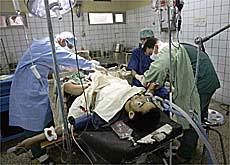Baghdad hospitals close to breaking point

The International Committee of the Red Cross has warned that Baghdad's hospitals are in danger of being overwhelmed as heavy fighting engulfs the city.
The Geneva-based organisation says water supplies are also running short in and around the Iraqi capital.
“Our delegates in Baghdad have told us that hospitals are really struggling and are stretched to their full capacity to deal with the war wounded,” said Florian Westphal, an ICRC spokesman in Geneva.
“There seems to be sufficient medical material available, but the problem is that the staff are finding it difficult to reach their workplace,” he added.
The ICRC’s representative in Baghdad, Roland Huguenin, said 150 injured Iraqis arrived at the city’s Al-Kindi hospital on Sunday night.
The influx took its toll on the hospital’s resources which ran out of surgical equipment for the first time during the fighting. The ICRC had to lend the hospital a lorry to fetch supplies.
Unconfirmed reports
Power shortages in Baghdad have compounded the problems faced by hospitals, which have to rely on generators to supply electricity and keep the water flowing.
Much of the power grid has been destroyed by coalition air strikes.
But keeping the generators running is proving a difficult challenge, with regular maintenance and fuel in short supply, according to the ICRC.
As a result, the humanitarian organisation is currently focusing its aid efforts on hospitals and water treatment plants in Iraq.
With United States forces penetrating deep into the Iraqi capital on Monday, there have been reports of people fleeing the city. But Westphal said the ICRC was unable to confirm this.
However, Iraqis have been turning up at the ICRC’s Baghdad office asking to call relatives abroad.
“People were prepared to wait over an hour in extremely difficult situations to reassure their families,” Westphal told swissinfo.
PoWs
Six expatriate employees are still manning the ICRC office in Baghdad, along with 40 to 50 Iraqis.
“They are very tense and stressed,” said Westphal. “Everybody who is in Baghdad is concerned about the situation and how it could develop.”
But the main fear for the ICRC is that staff could get caught in the crossfire while moving through the city.
Huguenin says their shelter, above ground but surrounded by sand bags, has so far escaped the attacks.
“So far, the belligerents have respected our emblem,” he said.
As well as trying to coping with the humanitarian crisis, the organisation is also visiting the thousands of Iraqi soldiers captured by coalition forces.
So far the organisation has already registered 4,500 Iraqi prisoners of war (PoWs). Delegates have yet to see coalition prisoners held by the Iraqis.
“Contacts on the issue are ongoing,” explained Westphal, “but given the situation, it could be very difficult to go where these prisoners are being held.”
swissinfo, Billi Bierling and Scott Capper
The ICRC says Baghdad’s hospitals are stretched to the limit because of the large numbers of wounded people.
The lack of power is compounding the problems already faced by the hospitals, which have to rely on generators.
The ICRC has been unable to confirm reports of people fleeing the Iraqi capital.
The organisation still has six expatriate employees in Baghdad, along with 40 to 50 Iraqis.
The ICRC has not able to visit coalition prisoners held by the Iraqis, but contacts on the issue have been made.

In compliance with the JTI standards
More: SWI swissinfo.ch certified by the Journalism Trust Initiative











You can find an overview of ongoing debates with our journalists here . Please join us!
If you want to start a conversation about a topic raised in this article or want to report factual errors, email us at english@swissinfo.ch.